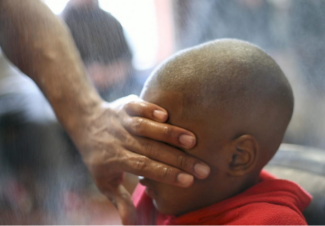Hale County, This Morning, This Evening (Ross, 2018): USA
Viewed by Larry Gleeson as part of the American Film Institute’s 2018 AFI DOCS Film Festival
 Hale County, This Morning, This Evening was written, directed and produced by RaMell Ross, and was winner of a Special Jury Prize at this year’s Sundance Film Festival. Ross tells the story of two African-American males, Daniel and Quincy, born in Hale County, Alabama, and the diverse paths their lives take. Hale County, This Morning, This Evening breaks the mold of a traditional documentary with its cinematic language and use of montage. For example, in the film’s opening sequence, an immediate distrust of the camera is highlighted in a bold directorial choice regarding one of the film’s subjects, Quincy, who works at a catfish plant to support his young family. “What is the orbit of your dreams?’ sneaks into the lower left-hand corner of the film in a title, textual overlay. A transition is made revealing a small-town street lined with black folks sitting on they cars. Nice non-diagetic music accompanies the camera as it glides down the street. Apparently, them folks is impervious to what is going on ’round them. Welcome to the Deep South where race is constructed and dreaming is an everyday part of existence. RaMell Ross is a philosopher, a photographer, a teacher a high-school basketball coach and now, with Hale County, This Morning, This Evening, a filmmaker.
Hale County, This Morning, This Evening was written, directed and produced by RaMell Ross, and was winner of a Special Jury Prize at this year’s Sundance Film Festival. Ross tells the story of two African-American males, Daniel and Quincy, born in Hale County, Alabama, and the diverse paths their lives take. Hale County, This Morning, This Evening breaks the mold of a traditional documentary with its cinematic language and use of montage. For example, in the film’s opening sequence, an immediate distrust of the camera is highlighted in a bold directorial choice regarding one of the film’s subjects, Quincy, who works at a catfish plant to support his young family. “What is the orbit of your dreams?’ sneaks into the lower left-hand corner of the film in a title, textual overlay. A transition is made revealing a small-town street lined with black folks sitting on they cars. Nice non-diagetic music accompanies the camera as it glides down the street. Apparently, them folks is impervious to what is going on ’round them. Welcome to the Deep South where race is constructed and dreaming is an everyday part of existence. RaMell Ross is a philosopher, a photographer, a teacher a high-school basketball coach and now, with Hale County, This Morning, This Evening, a filmmaker.
Ross utilizes his photography skills to great effect capturing simple, elegant moments that juxtapose other images like a grown man heaping a large truck tire onto a fire while off-screen voices provide commentary on the color and density of the smoke rising up into the air. This telling scene was proceeded by the title textual overlay, “What is done when all the cotton is picked?’ Ross is not sugar-coating the environment. This type of call and response brilliantly forms the crux of the film’s narrative. In another scene a young girl who really hasn’t learned to speak is being questioned by a semi-literate grown woman. First, she asked the young girl her name (though I couldn’t comprehend the pronunciation of the word “name”). When the girl didn’t reply, the woman asked a few more time with each rendering becoming more intelligible only to be followed up with a “How old you is?”
As a basketball coach, Ross has access to the film’s second primary character, Daniel, a strong, physically fit basketball player longing to escape the confines of his environment. Part of the beauty of Ross’s cinematography and consequent cinematic language is the tight framing of Daniel as he practices his jump shot. While Daniel might be confined for now, this (basketball) is his way out, his way to freedom from confinement.
In my opinion, the film ended rather abruptly evoking a feeling of wanting something more and left my pondering what I had just experienced. The montage of imagery alone makes this film worth seeing. But Ross adds a deep, visceral element, coupled with philosophical interjections, that creates a work of art transcending the confines of the theatre. It begs to be experienced. The result is a highly compelling, experimental film seemingly influenced by Melvin Van Peebles’ spawn of the Blaxploitation era, Sweet SweetBack’s Baadasssss Song. And, with a run time of a fast seventy-six minutes, it’s one you don’t want to miss! Highly recommended.
About this entry
You’re currently reading “Hale County, This Morning, This Evening (Ross, 2018): USA,” an entry on Student Film Reviews
- Published:
- 06.18.18 / 2pm
- Category:
- Documentary, Films
No comments
Jump to comment form | comments rss [?]